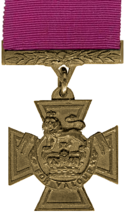John Smith (British Army officer, born 1816)
John Smith | |
|---|---|
 | |
| Born | February 1814 Ticknall, Derbyshire |
| Died | 26 June 1864 (aged 50) Jullundur, British India |
| Buried | Artillery Cemetery, Jullundur |
| Allegiance | |
| Service | Bengal Army |
| Rank | Ensign |
| Unit | Bengal Sappers and Miners |
| Battles / wars | First Anglo-Afghan War First Anglo-Sikh War Indian Mutiny |
| Awards | Victoria Cross |
John Smith VC (February 1814 – 26 June 1864) was an English recipient of the Victoria Cross, the highest and most prestigious award for gallantry in the face of the enemy that can be awarded to British and Commonwealth forces.
Details
Smith was 43 years old, and a sergeant in the Bengal Sappers and Miners, Bengal Army during the Indian Mutiny when the following deed took place for which he was awarded the VC. On 14 September 1857 at Delhi, British India, Sergeant Smith with two lieutenants (Duncan Charles Home and Philip Salkeld) and Bugler Robert Hawthorne showed conspicuous gallantry in the blowing in the Kashmir Gate in broad daylight under heavy fire. His citation reads:
For conspicuous gallantry, in conjunction with Lieutenants Home and Salkeld, in the performance of the desperate duty of blowing in the Cashmere Gate of the fortress of Delhi in broad daylight, under a heavy and destructive fire of musketry, on the morning of 14 September 1857, preparatory to the assault.
(General Order of Major-General Sir Archdale Wilson, Bart., K.C.B., dated Head Quarters, Delhi City, September 21, 1857.)
References
- ^ "No. 22131". The London Gazette. 27 April 1858.
- Monuments to Courage (David Harvey, 1999)
- The Register of the Victoria Cross (This England, 1997)
- The Sapper VCs (Gerald Napier, 1998)
External links
- Royal Engineers Museum Sappers VCs
- Use dmy dates from April 2012
- British recipients of the Victoria Cross
- 1814 births
- 1864 deaths
- British East India Company Army soldiers
- Bengal Sappers and Miners personnel
- People from Melbourne, Derbyshire
- Indian Rebellion of 1857 recipients of the Victoria Cross
- British military personnel of the First Anglo-Afghan War
- British military personnel of the First Anglo-Sikh War
- Deaths from dysentery
- Infectious disease deaths in India
- British military personnel stubs
